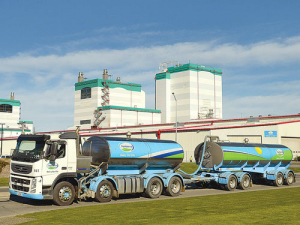Fonterra opens organic milk supply to South Island dairy farmers
South Island dairy farmers will soon be able to supply organic milk to Fonterra.
 Fonterra says it shouldn’t be forced to collect milk from farms with poor environmental credentials.
Fonterra says it shouldn’t be forced to collect milk from farms with poor environmental credentials.
Fonterra says it shouldn’t be forced to collect milk from farms with poor environmental credentials.
Fonterra chairman John Wilson says a lot has changed since the Dairy Industry Restructuring Act (DIRA) was enacted to launch the co-op in 2001.
“Today’s environment is so different,” he told a Northland Dairy Development Trust conference in Whangarei this month.
“Right now we are required to pick up milk from any farmer who is thinking about supplying milk.... If that farmer does not have great environmentl practices or is in an area that’s not great for dairying or has a highly fragile ecosystem, we are still forced to pick up that milk,” Wilson says.
“That’s not the right answer so regulations need to be changed to address that…. Unfortunately they were not changed by the previous government and we hope we can have a constructive conversation with the current government.”
The Labour-led coalition government has signalled a comprehensive review of DIRA.
It is also introducing a bill to prevent the expiry of the efficiency and contestability provisions of the DIRA in the South Island. This will mean the current regulatory regime will continue in place; it is due to expire on May 31 this year.
It includes the open entry-and-exit clause under which Fonterra must accept any application to become a shareholding farmer in the co-op, and accept supply of milk from that shareholder. Shareholding farmers can also readily exit from Fonterra and supply another dairy processor should they wish to do so.
Fonterra also has to sell up to 20% of its milk to other processors each season.
DIRA was set up to manage Fonterra’s dominant position in the NZ dairy market, until sufficient competition emerged. It contains automatic expiry provisions that were triggered in 2015 in response to the co-op’s reduced market share in the South Island.
More milk available
Fonterra says rival processors will need a competitive offering to catch milk from its suppliers.
Chairman John Wilson says farmers have seen processors come and go over time.
“We went through a period of five years until two years ago when our milk production grew at 5% average per annum.
“That’s a lot of milk growth; there has been a lot of milk available so other processors have been taking a slice of a growing pie. We strongly believe that environment has changed.”
Coming in at a year-end total at 3088 units, a rise of around 10% over the 2806 total for 2024, the signs are that the New Zealand farm machinery industry is turning the corner after a difficult couple of years.
New Zealand's animal health industry has a new tool addressing a long-standing sustainability issue.
The Government has announced that ACC will be a sponsor of this year's FMG Young Farmer of the Year competition.
As veterinary student numbers grow to help address New Zealand's national workforce shortge, Massey University's School of Veterinary Science is inviting more veterinary practices to partner in training the next generation of vets.
South Island dairy farmers will soon be able to supply organic milk to Fonterra.
Norwood has announced the opening of a new Tasman dealership at Richmond near Nelson next month.
OPINION: There will be no cows at Europe's largest agricultural show in Paris this year for the first time ever…
OPINION: Canterbury grows most of the country's wheat, barley and oat crops. But persistently low wheat prices, coupled with a…